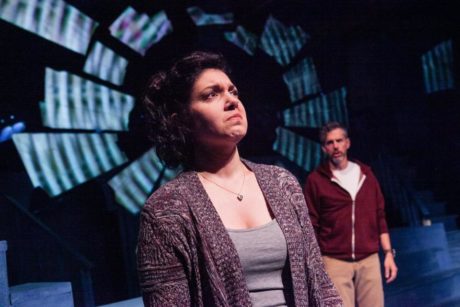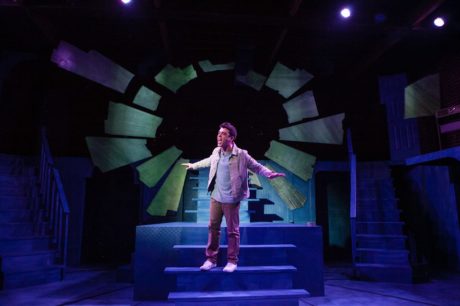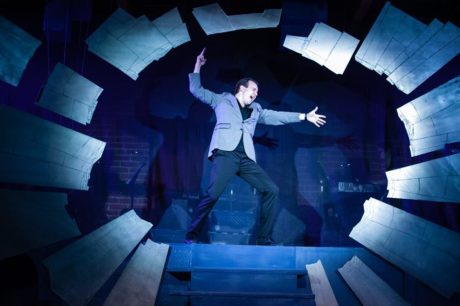Post-Play Palaver is an occasional series of conversations between DCMetroTheater Arts writers who saw the same performance, got really into talking about it, and decided to continue their exchange in writing. That’s what happened when Senior Writers and Columnists Sophia Howes (Dangereuse) and John Stoltenberg (Magic Time!) saw the musical Next to Normal at Keegan Theatre.

Sophia: The beauty of Kari Ginsburg’s performance as bipolar wife and mother Diana Goodman is that she herself almost seems gifted with extrasensory perception. “What am I doing with all these crazy people?” she appears to wonder, as she stares despairingly at her therapist, or her husband, or her daughter. She is too big a personality for the tiny box she has been placed in.
Her husband Dan (Chad Wheeler), too, is trapped. Being forced into (or choosing) a caregiving role because of his wife’s illness, has drained all the passion out of him. He is a faithful, honorable husband, but he has become an empty shell. And she, perhaps rightly, resents being pushed into the role of The Problem, even if she is one. Their relationship has been hollowed out by this tragedy, preceded by an even earlier and more devastating tragedy in their lives.
Their daughter Natalie (Caroline Dubberly), invisible to her mother, has turned to personal achievement as a kind of solace. It does not save her. But what does save her, to the extent she can be saved, is love.
The pain of these characters is palpable, but what makes the production so breathtakingly absorbing is the omnipresence of love; as a healing presence, as a source of torment, and as the ultimate gift we can give to another person.

John: Wasn’t it extraordinary that we walked out of Keegan’s Next to Normal and kept talking about the characters as if they lived real lives as real people?! To my mind that’s a measure of the insight and sensitivity of both the musical itself and the performances in equal measure.
I had a similar experience after seeing If/Then, which was also composed by Tom Kitt and also has lyrics by Brian Yorkey. Significantly, and maybe not coincidentally, both Next to Normal and If/Then center on a female character who is complex and credible and whose inner emotional life grounds the authenticity of the whole show.
At Keegan that comes through movingly in Ginsburg’s amazing performance as Diana. She never belts it or plays it broad, the way one would expect with more typical, razz-ma-tazz, and less authentic central female characters in male-conceived and -written musicals (like Mame or Gypsy). Ginsburg’s nuanced performance always stays loyal to Diana’s truth, which the creators never betray either.

The caliber of the whole cast is terrific; their voices are gorgeously well-matched; the direction (Mark A. Rhea and Colin Smith) and musical direction (Jake Null) are superb. And so the compelling honesty that Ginsburg delivers as Diana comes through in the performances of all the other characters as well.
I loved the scene when Diana imagines she is dancing with her son Gabe (David Landstrom), and they sing “I Dreamed a Dance.” The way he regards her then is so gosh-darn touching. And I loved the scene when Diana and her husband Dan are stage right, and Natalie and her boyfriend Henry (Christian Montgomery) are stage left, and they sing “Why Stay?/A Promise.”

The uncanny parallels between the two relationships are clear in the music and lyrics—each of the two men is trying their best to be there for the woman they love; each of the two women is wary, wounded, unable to love them back. But the scene could not have had the heartrending emotional wallop it had without each singer/actor’s fidelity to their character’s inner life.
Sophia: It’s very true that the writers seem to get inside the head of the female central character, Diana. There are many pressures on her; to be a good wife and mother while grieving a loss and trying to cope with her illness. This is a huge task for anyone. Perhaps one of the reasons she is so interesting is that though her mind is fascinating, she has no power in the external world and must respond emotionally to her husband and a male therapist. Her alienation from her daughter may suggest an alienation from her inner, female self. She is also very imaginative and it is easy to see now she could become frustrated with the limitations life and her condition have placed on her.
One standard remedy that is suggested for women to help them get in touch with themselves is some kind of career; this seems to be impossible for her, which doesn’t help matters. You mentioned that we were talking about the characters as if they were real people; this is so true. Quite a triumph for all concerned.

Scott Ward Abernethy as Doctor Fine and Doctor Madden has an exceptional challenge. Therapists on stage can be hard to write about and even more difficult to act. And he is playing two therapists! He underplays beautifully and saves his rare moments of emotion for when it counts. As we discussed, David Landstrom has a difficult task as an actor, which I won’t elaborate on because it gives away too much of the plot. He does a marvelous job.
Perhaps the most impressive aspect of the production is that it avoids the trap of being “a musical about mental illness.” The term bipolar, while clinically significant, cannot encompass the dizzying variety of patients it must apply to. This is not an “issue” piece but a moving portrayal of a very specific family.
Perhaps this is part of a trend of musicals on serious subjects, such as Dear Evan Hansen. If there is such a trend, I for one celebrate it.
John: Indeed! And what’s equally heartening is that the three musicals we’ve just touched on—Next to Normal, If/Then, and Dear Evan Hansen—are not adaptations of anything; they are original stories about completely contemporary lives.
What Next to Normal also shares with those others is a total absence of cheese. That’s a technical term of art for: “We the creators of this show don’t really have a very high opinion of your mental wherewithal or emotional intelligence, so we’re going to distract you from the shallowness of our project with some trite musical theater conventions that are guaranteed to make you think you’ve had a satisfying evening in the theater.”

Sorry, that was snark (and I promise not to mention the names of any offending shows). But I really mean it as a compliment (albeit a backhanded one) for what the creators of Next to Normal have given us and for what the Keegan team has delivered with such subtlety and grace. The creators trusted the truth in their characters’ stories, and the actors trusted the truth in the material. And we who attend to the production are generously extended the opportunity to trust in turn the truthfulness in their portrayals.
That does something. That makes something happen. A consequence. A connection.
I hope it’s okay if I paraphrase something you said right after the show was over and the house lights came up. You said how human the show had made you feel. And I know that came from a very personal place. But in retrospect I realize what you said spoke for me too—it expressed, better than anything I can now think of, the ineffable feeling the production leaves us with.
Running Time: Two hours and 20 minutes, with a 15-minute intermission.
Next to Normal plays through July 10, 2016 at The Keegan Theatre – 1742 Church Street, in Washington, DC. For tickets, call (202) 265-3767, or purchase them online.





